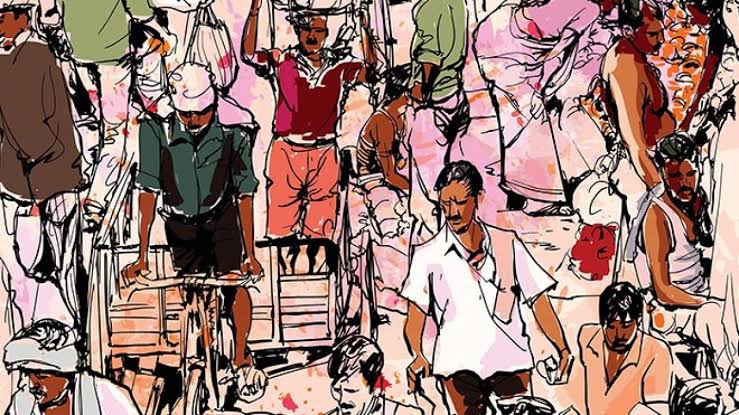What is it about our culture today that makes us unable to admit that we are who we are?
by Soni Razdan
I read an article the other day about the new ‘urban poor’. These are young men and women who do not come from underprivileged backgrounds, but they make certain choices that ensure they suffer the disadvantages of a person of lesser means. For instance, they may come from a smaller city to a bigger one, have a decent job and are on the up. However, in trying to keep up a certain standard of living, and appear very well off when they are not, they will skip meals so that they can eat at an expensive joint once in three days, or buy expensive clothes and find that before the month’s end, they don’t have enough left to eat with and so on.
And this set me thinking. What is it about our culture today that makes us unable to admit that we are who we are, possibly poor and struggling?
Many years ago, too many for my liking, I was also urban poor, but not for the same reasons. I know what it is to struggle, to not have any idea where the next year of meals is going to come from, to be alone and bereft in a strange country. And I know what it is to survive by wit and sheer dint of hard work. This then is my story. Or part of it at any rate – the urban poor part.
Coming from a normal middle class family in the Bombay of yore, we (my sister Tina and I), had the best of everything but never more than that. We went to a great school, (Bombay International), were members of the Bombay Gymkhana club, had one car, but no driver. Dad drove himself, as did I, as soon as I learned to drive. We were better off than many families and our parents always ensured food on the table and plenty of swimming and badminton at the club and the best books to read from Warden Book House. We had what we had and we were proud of that.
But those days were simpler, you see. The best of families had one car. No TV in most homes yet. Most bathrooms had white Johnson and Johnson tiles and we were just as clean then as we are now. Phones were a luxury and usually meant you had paid a bribe, or you worked for a company. (The word ‘corporate’ didn’t exist, or at least we hadn’t heard of it.) We didn’t have one till I was in the 8th Standard because my father was an upright man who never paid bribes and didn’t take them either. So we were not rich, but we were enriched by life and drama and honesty as were most families that we knew then.
So when I wanted to go to London to study drama, my parents tried many tricks in the book to dissuade me naturally. How would it be possible, they reasoned? We could not afford it.
I was a stubborn kid. Well, wherever there was a way, there was a will to follow. Having a British passport and a grandma in Birmingham, U K was the first step that I could exploit. So we settled on me going at the tender age of 17 to her house to live and do my A Levels in a crash course ( one year instead of two ) while I sussed out the drama school issue. May I add here that the reason I wanted to go abroad was being half Indian and half German. I honestly felt I had a better chance there, as I did not fit in to the kind of films that were being made here at that time. Much has changed of course meanwhile!
My mother and sister came to Birmingham to have a holiday and leave me there. My most desolate memory is of dropping my mom to the airport, when she finally had to leave. My one lifeline to my safe little life in Bombay left with that plane. I returned to grandma rather lost, but more determined than ever to make things happen.
And happen they did, but not without huge struggle and effort, and then some amazing luck as well.
While I did my A Levels, I also did walk on parts for a series called ‘Gangsters’ at the BBC in Birmingham. That was a series in which the well known actor Sayeed Jaffrey also starred, by the way. And he and I happened to bump into each other in the lift one day. Now remember, I was a glorified extra. I was a nobody. But I was pretty. And looked kind of Indian.
He asked me my name. ‘Soni Razdan’ I said.
‘Razdan, Razdan… ‘ he said musingly and a bit wistfully. I looked at him curiously. ‘I used to know a girl with this surname,’ he said then. ‘In fact, I was in love with her. In Shimla. Her name was Swarup Razdan.’
I blinked. “OMG!” I said. Or something to that effect. Because that wasn’t the cool phrase in those days. “She’s my aunt. My father’s sister.”
Sayeed Jaffrey was delighted. And of course he never forgot me. Years later, we worked together again in Shyam Bengal’s Mandi. But before that, he did something amazing that also changed my life. But I will come to that later.
While at the Bourneville College for Further Education, swotting up for the A Levels, I also attended classes at the local Birmingham Theatre School. I think I stood out in some way because I was later singled out for something through them that again changed my life in a big way.
So while doing these walk-on-parts, I applied for a place in drama school in London. I had no money to pay for my fees. But I applied because, well, when did the lack of money ever stop me from doing anything in life?
I applied to three schools, LAMDA, Central and Guildhall.
The Guildhall auditions were first. Off I went to London early one morning, full of hope with only one desire: kill it.
The auditions lasted all day, divided into four parts. After the first two parts, we had a break for lunch. You were either called back for more or told politely that you could go home. I was called back for more.
I was too excited to eat lunch so I walked up and down the bridge on the embankment till it was time to go back.
I cleared the next two rounds, and that was it. Out of three hundred and fifty applicants they chose 21 boys and 9 girls. I was one of the nine girls. A week or so later I got an acceptance letter – I had done it!
But now loomed another problem. The main one. I had no money to pay for the fees, which was 700 pounds a year in 1975. Let alone go and live in London, what was I to do now? How could I give up my dream of becoming an actress when I was so close to my goal? Or at least several steps closer to my goal. (to be continued)
Born to Kashmiri Pandit father and British-German mother, Soni Razdan is an actor who has worked in notable films like Saransh, Raazi, No Fathers in Kashmir, Daddy and Page 3.


